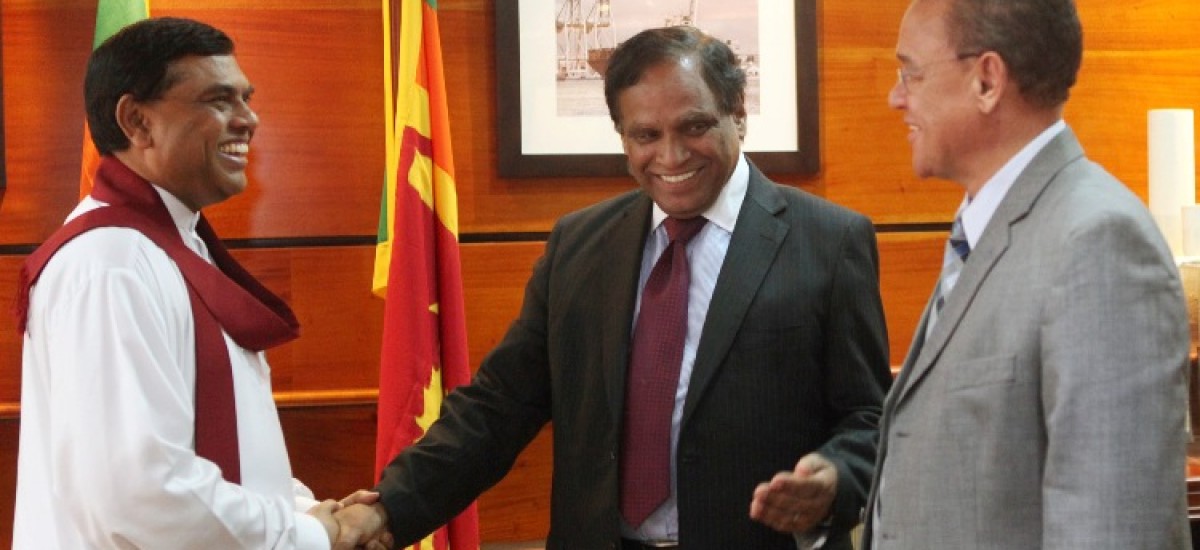Ebrahim Ebrahim, Deputy Minister of International Relation and Cooperation Republic of South Africa meeting Basil Rajapaksa, Senior Adviser to the H.E. President and Minister of Economic development. Via Ministry of Economic Development.
General elections in South Africa concluded a few days ago and the results were a resounding reelection victory for the ruling African Nation Congress and the government of President Jacob Zuma. Twenty years after the end of apartheid and into its third ANC president, the people of South Africa has maintained their faith in their national liberation movement and reelected the ANC for a further period of five years, till 2019. At home, 2014, also marks twenty years since Sri Lanka Freedom Party led alliances, first the PA and its successor UPFA has ruled Sri Lanka, albeit two years in a co-habitation with the UNP. An early presidential poll next year will determine whether Sri Lanka follows South Africa, in a near quarter century run for a ruling alliance.
South African efforts at facilitating post war reconciliation
Bubbling under the surface for awhile, but now out in the open is the nascent attempt by the African National Congress (ANC) Government of South Africa to facilitate and promote post war reconciliation in Sri Lanka. The exploratory efforts so far, which began with a UPFA Government delegation and a Tamil National Alliance delegation visiting South Africa as far back as early last year, has been kicked into higher gear during the CHOGM summit when President Rajapakse requested President Zuma to assist Sri Lanka in its reconciliation process. The consequential result was that South Africa appointed former ANZ General Secretary and its chief negotiator Cyril Ramaphosa as its special envoy to Sri Lanka and also to South Sudan, a country in the throes of a near civil war. Subsequent to the appointment of the special envoy, earlier this year once again a delegation from the UPFA Government and the TNA visited South Africa for meetings with Mr.Cyril Ramaphosa. Both the government and the TNA have invited the special envoy to visit Sri Lanka, get a firsthand account of the situation and take forward the initiative to facilitate Sri Lanka’s post war reconciliation.
A polarized society in need of reconciliation
That Sri Lanka’s reconciliation process needs significant assistance and serious boost has been proved both domestically and internationally. Domestically the Government tells us that there are attempts to revive the LTTE militarily, through the efforts of a since deceased former LTTE cadre called Gopi and every Tamil Diaspora organization whose names were on the war time records of the LTTE. Accordingly all Tamil Diaspora groups were banned in Sri Lanka, though even the host governments of these organizations, who have banned the LTTE themselves, remain to be convinced that these groups are now terrorists as opposed to political activists. The voting paten in the Northern Provincial Council election where the UPFA secured seventeen (17%) of the popular vote, demonstrates the extent of the Government’s failure in the post war reconciliation and the hearts and minds campaign.
The UNHRC investigation into violations of international law
The third successive UNHRC country specific resolution on Sri Lanka in March this year, now mandating an investigation into the violations of international law in Sri Lanka based on the failures of the reconciliation process, demonstrate that the international community in multi lateral forums are of the opinion that Sri Lanka has failed in its reconciliation efforts. Basically they are taking Presidential Secretary Lalith Weeratunga’s snazzy presentation on the supposed progress on implementing the LLRC proposals with more than a pinch of salt. The reality of the situation as any objective observer could see, is that the Rajapakse Administration has basically failed to implement the significant recommendations of the Lessons learned and Reconciliation Commission (LLRC).
Ad hoc appointments to the Supreme Court
Causing some disquiet amongst opinion makers and civil society has been the appointment from the private bar of Attorney at Law, Priyantha Jayawardena as a judge of the supreme court. If the Bar Association, which is aghast at the appointment, is underwhelmed by the latest supreme court nominees credentials for the position, it is understandable. However, the appointment of proposed Justice Jayawardena would be seen internationally in the context of the impeachment of Chief Justice Shiranie Bandaranaike and the appointment of Mohan Peiris as Chief Justice, a disputed move which was only very recently regularized, through the Supreme Court ruling against its own prior determination of the justiciability of proceedings of parliamentary select committees. However, the issue at stake, is Sri Lanka’s insistence in international forums and specifically at the UNHRC in Geneva, that it has effective domestic remedies for citizens aggrieved with actions by the State. This contention is now also challenged and impeaching a chief justice and making ad hoc appointments to the apex court does not inspire confidence in the independence of the judiciary. Even countries such as Zimbabwe under Robert Mugabe, Myanmar under Than Shwe’s military junta and North Korea under its dictator has a judiciary and a court system. Just no one takes it seriously as a means of ensuring justice for citizens. At best they are a part of maintaining order, without much of a focus on justice. Sri Lanka risks heading in the same direction, with serious implications for its post war reconciliation process, the rights of citizens and democratic and free society.

